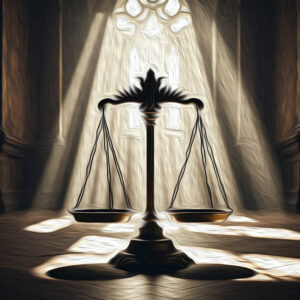The Bible tells us that God is holy and just, and as a result, He must punish sin. If you were to stand before God on Judgment Day, would you be innocent or guilty? If you’re honest with yourself, you’d be guilty. The truth is, by God’s standard, we are all guilty (Romans 3:23). Just like how criminals in our civil society are sent to jail for breaking the law, God also sends those who are guilty to a type of jail—eternal separation from God in a place called the Lake of Fire. (Romans 6:23; Revelation 20:11-15).
But what if you’ve only told a few lies or stolen something small? Surely God would not send someone to the Lake of Fire for a few tiny sins, right? Imagine you are hanging over a deep chasm by a chain with ten links. If you were to break any one of those links the result would be the same— you would fall to your death. The same is with God’s law. If you break one commandment, even one time, it is the same consequence as if you broke them all many times (James 2:10).
But how could a loving God send people to the lake of fire? God is loving, but He is also just and good. Think about a human judge— if someone commits a serious crime, would a judge be considered good if he was to let that person go without punishment? Of course not! A judge that doesn’t carry out punishment for breaking the law is a bad judge! In the same way, God, as the perfect Judge, must ensure justice is served. Because He is Holy, He cannot ignore or overlook sin. His justice demands that sin be punished (Nahum 1:3).







